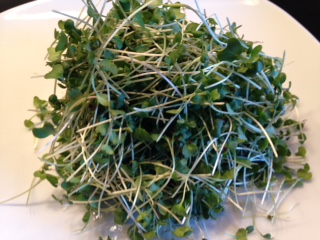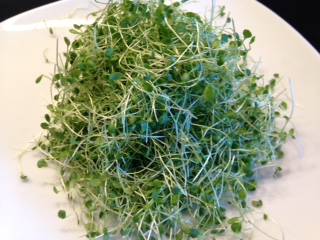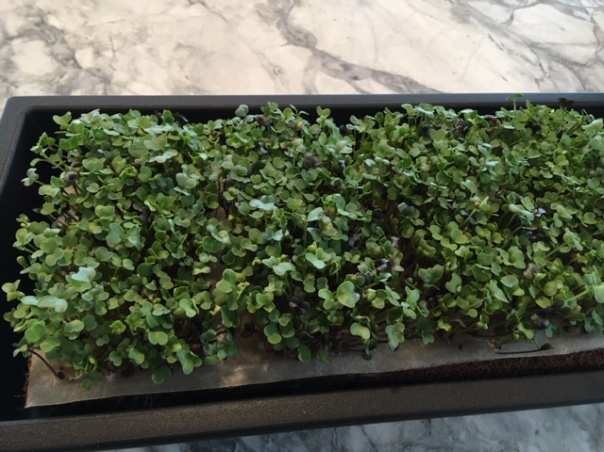[Editor’s note] This post was originally published in February 2017. It has been updated and republished in March 2019
It is well known that cruciferous vegetables such as broccoli and watercress contain powerful anticancer compounds. But did you know that eating their respective sprouts can supercharge the health benefits? Sprouts are high in vitamins C, A, and phytonutrients that support the immune system.
In sprout form these little three to four day old plants contain almost 100 times the level of cancer-fighting sulforaphane than the mature plants. The phytonutrients in these sprouts up-regulate antioxidant enzymes and detoxification processes which clear toxic compounds from the body. And, that is just the beginning—read on to find out how sprouts knock the socks off cancer.
What’s in a Sprout
Isothiocyanates (ITCs), such as sulforaphane, are sulfur-containing compounds found in cruciferous vegetables. They support matrix metalloproteinase-9 (MMP-9) activity which reduces the breakdown of connective tissue within a cell that impede the expansion of existing tumors. Matrix MMP-9 plays important roles in tumor invasion and angiogenesis. Secretion of MMP-9 has been reported in various cancer types including lung, colon, and breast cancer.
ITCs also kill off cancer cells, including cancer stem cells, which is essential for combating cancer metastases. Isothiocyanates restrain certain pro-inflammatory compounds that are associated with chronic inflammation and cancer.
The ITC sulforaphane helps support the anti-inflammatory Nrf2 pathway which protects cells against oxidative and free radical activity. It supports the detoxification process by inducing Phase 2 detoxification enzymes, inhibiting the activation of pro-carcinogens, and by boosting cellular glutathione levels. Sulforaphane promotes cancer cell death and inhibits cancer cell proliferation. It also supports the immune system and in particular, increases Natural Killer Cell activity.
Sulforaphane also inhibits Helicobacter pylori, the bacterium that increases one’s risk of stomach and colorectal cancer. It is also anti-viral and has been found effective against the Epstein Barr Virus and may be helpful against Coronavirus (COVID-19).
Quercetin, another potent antioxidant highly concentrated in sprouts, is a strong anti-inflammatory and prevents tumor cell growth. It also aids in the removal of excess estrogen from the body — it stimulates liver function to detoxify estrogen and other carcinogenic agents.
Lutein is another powerful antioxidant that neutralizes cancer-causing free radicals (it is also essential for many things, including eye health, protecting against macular degeneration, and for maintaining strong eye tissue). Lutein (and zeaxanthin) may be beneficial to cardio health by preventing hardening of the arteries.
Glutathione has been labeled the ‘mother of all antioxidants” due to its incredible ability to disarm free radicals, detoxify the body, and boost the immune system.
Broccoli Sprouts
 Broccoli sprouts are extremely high in cancer fighting activity, particularly against lung, colon, and breast cancers. Compounds in broccoli speed up the removal of estrogen from the body, helping to suppress breast cancer. They also target cancer stem cells, the cells responsible for metastasis.
Broccoli sprouts are extremely high in cancer fighting activity, particularly against lung, colon, and breast cancers. Compounds in broccoli speed up the removal of estrogen from the body, helping to suppress breast cancer. They also target cancer stem cells, the cells responsible for metastasis.
Broccoli sprouts contain a high amount of the cancer-busting and immune boosting substance sulforaphane. They are also abundant in quercetin, glutathione, beta carotene, indoles, vitamin C, lutein, glucarate, and the metabolic substance DIM, which is a natural aromatase inhibitor.
Broccoli sprouts are rich in cholesterol reducing fiber and have anti-viral and anti-ulcer activity. They are also a super source of chromium that helps regulate insulin and blood sugar.
Watercress Sprouts
Sometimes called peppergrass, watercress is delicious and pungent. It is also one of the most nutrient-dense foods known. It is rich in beta-carotene and other carotenoids, including lutein. Watercress also offers significant quercetin, EGCG (Epigallocatechin Gallate), flavanols such a kaempferol, lycopene, indole-3 carbinol (13C), sulforaphane, as well as DIM. It is a good source of riboflavin, vitamin C, A and K, calcium, magnesium, vitamin E, and contains trace amounts of omega 3’s. Watercress is one of the best food sources of iodine for vegans.
Watercress also contains a high amount of PEITC (phenylethylisothiocyanate) which has been shown to protect DNA from damage. PEITC reduces the growth of breast cancer cells, triggers apoptosis (cancer cell death), and decreases angiogenesis. It inhibits the growth of HER2 expression as well as cancer metastasis.
PEITC (also found in some other cruciferous vegetables, including broccoli) deactivates mutant p53 in tumor cells but leaves normal p53 alone. P53 regulates cell division by keeping cells from growing and dividing too fast or in an uncontrolled way. A mutation in p53 is a permanent change in the nucleotide sequence of DNA. Loss of p53 function can be deleterious, and about 50% of all human cancers have a mutated p53 gene.
Watercress has antioxidant, antigenotoxic (the process by which chemical agents damage genetic information within a cell causing mutations), and anti-inflammatory properties.
Studies show that a regular intake of watercress has been associated with protection against breast, colon, and other cancers.
Watercress and broccoli affect all stages of cancer: initiation, proliferation, and metastasis. So, what’s not to love about these sprouts? Plus, it is a lot easier to consume a handful of sprouts than it is to down a pound and a half of broccoli or an enormous plate of watercress– which, for example, is the amount it would take to get an equivalent amount of sulforaphane.
Add sprouts to your smoothies; use on sandwiches, on top of pizza, in salads, and as a garnish for soups. I make wonderful gluten-free pizza crusts using cauliflower or garbanzo bean flour, and pile the pizza high with arugula and sprouts just before serving. Yum!
Just a reminder that while eating cruciferous vegetables is a important for overall optimal health, it may support you during the COVID-19 pandemic. Choose to consume cruciferous vegetables (broccoli, Brussels sprouts, radish, and kale). It is necessary to have sufficient iodine in the diet when consuming high quantities (including DIM).
Can’t find sprouts locally or worried about others handling your raw vegetables? Grow your own. You can grow your own sprouts and now it is easier than ever (no changing the water several times a day, just add water to the tray day one and done. Here is my first tray of Hamama salad green sprouts.. Next up are broccoli sprouts. Order your own Hamama sprout kit.

Hamama Salad Green Sprouts
Here is a great book if you wish to learn more about growing your own sprouts: Year-Round Indoor Salad Gardening: How to Grow Nutrient-Dense, Soil-Sprouted Greens in Less Than 10 days
Curcera-SGS is an excellent supplement if you cannot find or grow broccoli sprouts.
In your everlasting good health,
Elyn
~~If you don’t know your options, you don’t have any~~
Elyn Jacobs is a breast cancer survivor and holistic cancer strategist who helps people make better, healthier, non-toxic choices. She emphasizes the critical nature of addressing the root cause of cancer and not just its presenting symptoms (such as the tumor). Elyn specializes in understanding the role of estrogen in breast cancer and debunks the myths associated. She is a Contributing Editor for The Truth About Cancer and was creator and host of the Survive and Live Well Radio Show on the Cancer Support Network. Elyn is on the Medical Advisory Board for BeatCancer.Org and is on the Advisory Board to the Radical Remission Project. Elyn was the former Executive Director of the Emerald Heart Cancer Foundation. Contact Elyn via her website. Elyn offers consults via Skype, phone or in person.
Follow Elyn on Facebook
Follow Elyn on LinkedIn
DISCLAIMER:
Elyn Jacobs does not provide medical advice. The information provided is for general information only. No online site should be used as a substitute for personal medical attention.
This information is for educational purposes only and is not a recommendation to forgo medical advice and treatment. This post is not intended to treat, cure, prevent, or diagnose any disease or condition. This post does not represent medical advice nor should it be considered to be medical advice or a replacement for medical advice. I encourage you to discuss this information with your integrative oncologist, naturopathic doctor, or conventional oncologist. The information provided is from my research and not to be taken as scientific evidence.
Affiliate Links Disclosure:
Some product links on some posts are affiliate links. This website is monetized in part through the use of affiliate links. This means that if you were to click on a link that is an affiliate link and purchase an item after clicking on that link, I may receive a small percentage of the sales price. I only recommend products that I love and use often. Thank you for your support!

You Can Beat Lung Cancer: Using Alternative Interventions
#1 Best Seller on Amazon for Lung Cancer Books

 Elyn Jacobs is a breast cancer survivor and holistic cancer strategist who helps people make healthier, less-toxic choices for their healing. She emphasizes the importance of not just surviving cancer, but surviving well and reducing the risk of recurrence. She is a Contributing Editor for The Truth About Cancer and is on the Medical Advisory Board for BeatCancer.Org and the Advisory Board to the Radical Remission Project. Elyn has written for numerous journals and publications. She was the former Executive Director of the Emerald Heart Cancer Foundation and the creator and host of the Survive and Live Well Radio Show. To contact Elyn, visit
Elyn Jacobs is a breast cancer survivor and holistic cancer strategist who helps people make healthier, less-toxic choices for their healing. She emphasizes the importance of not just surviving cancer, but surviving well and reducing the risk of recurrence. She is a Contributing Editor for The Truth About Cancer and is on the Medical Advisory Board for BeatCancer.Org and the Advisory Board to the Radical Remission Project. Elyn has written for numerous journals and publications. She was the former Executive Director of the Emerald Heart Cancer Foundation and the creator and host of the Survive and Live Well Radio Show. To contact Elyn, visit 



